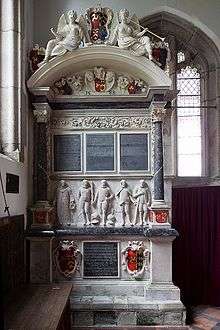Edmund Tremayne

Edmund Tremayne (c. 1525–1582) was an English conspirator and official He was dedicated to Protestant causes, in opposition to the policy of Mary Tudor.
Tremayne was an assistant to Edward Courtenay, the first earl of Devon. Devon was suspected of involvement in Wyatt's rebellion against Mary, and Tremayne was taken to the Tower of London in 1554. There he was tortured on the rack for evidence but kept silent. After ten or eleven months in prison, he was released on a £40 fine, and he left England for Italy with Courtenay.
He wanted to join Sir Henry Sutton Dudley's conspiracy against Mary, and he joined the camp of English rebels at Rouen before the conspiracy was exploded in April 1557. He then attached himself to Francis Russell, 2nd Earl of Bedford, who was another figure plotting against Mary.
When Elizabeth assumed the throne, she rewarded Tremayne. He was elected a Member of Parliament for Tavistock, and he was raised to a commissioner of Lancaster. From 1561-1574, he was the chief recipient of royal taxes for the district. He was also interested in the conversion of Ireland. William Cecil had asked him to study the question, and he wrote Causes why Ireland is not Reformed. In 1571, he was a clerk of the Privy Council. He did not marry until 1576, when he married Eulalia.
Tremayne was friends with Sir Francis Drake, who was his cousin.
References
- Bartlett, Kenneth R. "Edward Tremayne". In Matthew, H.C.G. and Brian Harrison, eds. The Oxford Dictionary of National Biography. vol. 55, 283-284. London: OUP, 2004.
- Specific
- ↑ French: trois mains, "three hands"
- ↑ Pole, Sir William (d.1635), Collections Towards a Description of the County of Devon, Sir John-William de la Pole (ed.), London, 1791, p.505, fists argent. Vivian, Lt.Col. J.L., (Ed.) The Visitations of the County of Devon: Comprising the Heralds' Visitations of 1531, 1564 & 1620, Exeter, 1895, p.730: fists proper
| Political offices | ||
|---|---|---|
| Preceded by Edward Waterhouse |
Chief Secretary for Ireland 1569–1571 |
Succeeded by Philip Williams |